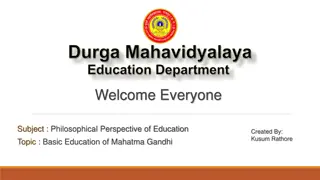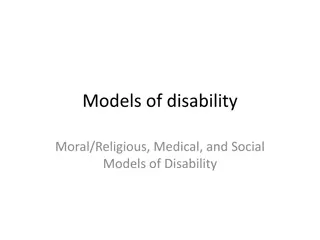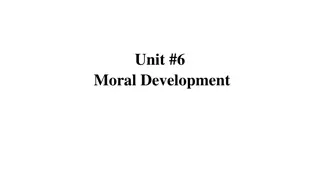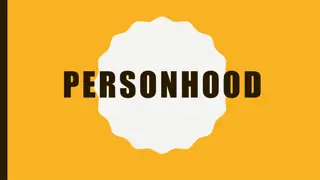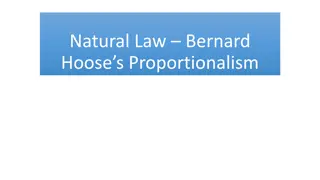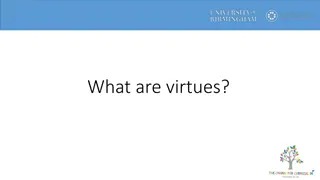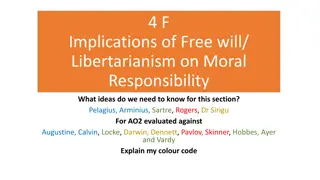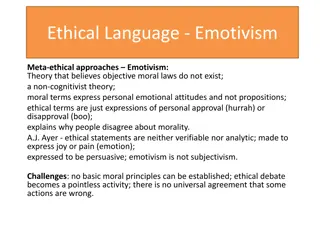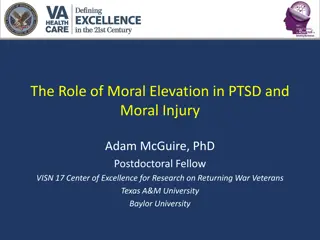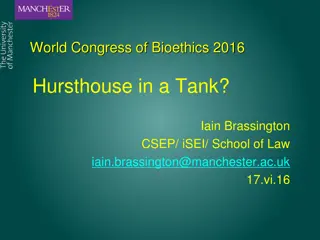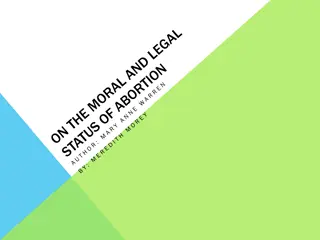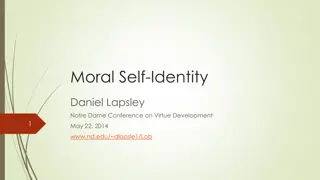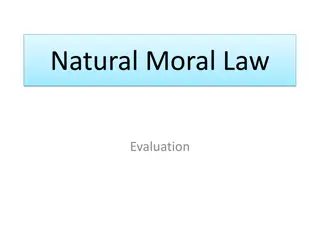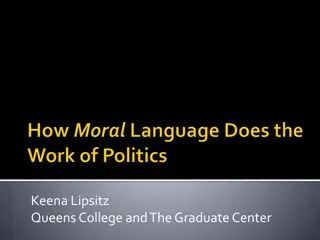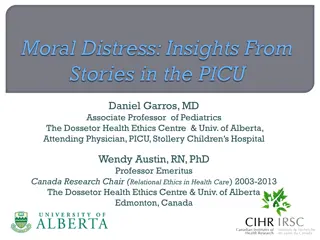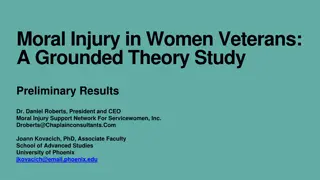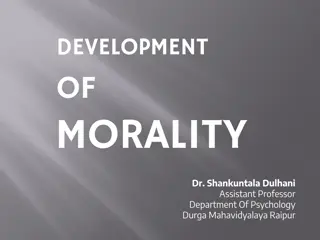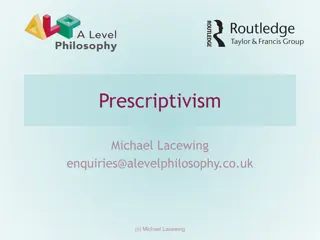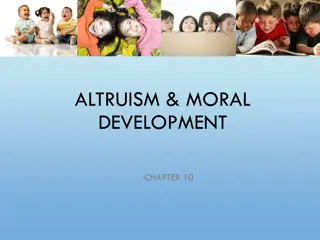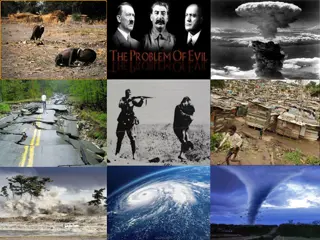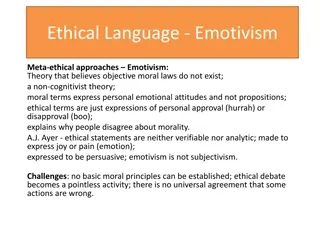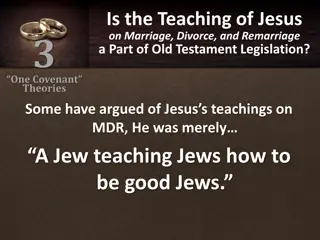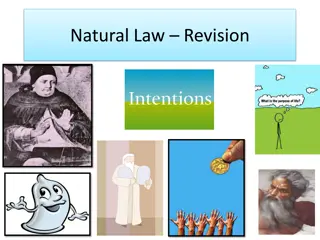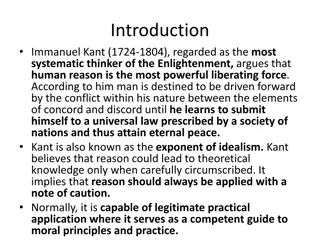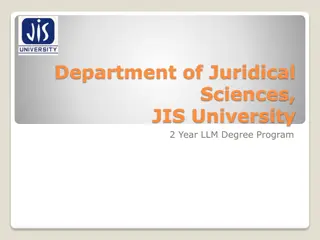Uncovering the Violent History of Capitalistic Enclosures
Explore the historical context of capitalist enclosures, their violent impacts on peasants, and the moral justifications used to conceal these atrocities. Delve into how economic narratives created moral bubbles to justify violent acts, as examined through the lens of Marx's analysis. Unveil the par
1 views • 11 slides
Durga Mahavidyalaya
Education is viewed as the acquisition of knowledge, skills, beliefs, and moral habits. Mahatma Gandhi introduced his Basic Education concept emphasizing free and compulsory education, mother tongue instruction, craft-centered learning, moral education, and character building. The curriculum include
0 views • 6 slides
Understanding Models of Disability: Moral, Medical, and Social Perspectives
The concept of disability is explored through moral/religious, medical, and social models. Impairment refers to a loss or abnormality in structure or function, while disability is a restriction in performing activities. The discussion also delves into the significance of person-first language and th
1 views • 35 slides
Cultivating Decency and Moral Excellence in Daily Life
Embrace a life of decency and moral refinement through moderation, purity, and vigilance. Uphold virtues of modesty, temperance, and clean-mindedness in all aspects of existence, fostering an environment of respect and dignity. Strive to elevate your character towards the divine, embodying qualities
0 views • 18 slides
Understanding Kohlberg's Stages of Moral Development
Kohlberg's stages of moral development, built upon Piaget's psychological theory, outline six developmental stages of moral reasoning, with each stage offering a higher level of response to moral dilemmas. Kohlberg focused on justice in moral development and emphasized the importance of how individu
0 views • 19 slides
Understanding Moral Development and Moral Reasoning
Moral development involves an individual's sense of right and wrong, influenced by family, school, friends, and societal environment. Children learn moral concepts from interactions with parents, teachers, peers, and society, shaping their understanding of good and bad. Additionally, moral reasoning
0 views • 13 slides
Understanding Gas Laws: Boyle's, Charles', Gay-Lussac's, and Avogadro's Laws
Gas laws such as Boyle's Law, Charles' Law, Gay-Lussac's Law, and Avogadro's Law govern the behavior of gases under different conditions. Boyle's Law relates pressure and volume at constant temperature, Charles' Law relates volume and temperature at constant pressure, Gay-Lussac's Law relates pressu
1 views • 19 slides
Understanding Personhood: Philosophical Perspectives on Moral Consideration
Exploring the concept of personhood involves delving into what it means to be part of a moral community and deserving of moral consideration. Various criteria, from genetic to cognitive and social, are discussed, shedding light on the complex debates surrounding animal rights, abortion, euthanasia,
0 views • 10 slides
Understanding Bernard Hoose's Proportionalism in Natural Law Theory
Bernard Hoose's Proportionalism presents a modern take on Natural Law theory, offering a hybrid approach that considers teleological perspectives. Proportionalism acknowledges certain acts as inherently wrong but allows for exceptions based on proportionate reasons. This flexible framework operates
5 views • 18 slides
Understanding Virtues and Practicing Ethical Behavior
Virtues, such as resilience, compassion, and integrity, represent moral excellence. Practicing virtues leads to a good life, according to Aristotle. By understanding virtues like gratitude and reasoning, individuals can cultivate a sense of moral responsibility and ethical behavior. The concept of t
0 views • 8 slides
Moral Responsibility and Free Will Implications in a Contemporary Context
This text delves into the implications of free will and libertarianism on moral responsibility, examining the ideas of various philosophers and thinkers such as Pelagius, Arminius, Sartre, and more. It explores the concepts of moral agency, determinism, normative ethics, religious beliefs, and the c
5 views • 12 slides
Understanding Emotivism in Ethical Philosophy
Emotivism is a meta-ethical theory that rejects objective moral laws, instead positing that moral terms express personal emotional attitudes, not universal truths. Influenced by A.J. Ayer and rejecting naturalism, this theory suggests that ethical statements are not objective propositions but rather
0 views • 28 slides
Contrasting Legal Systems Around the World
Explore the diverse legal families globally, such as Civil Law (Romano-Germanic) and Common Law (Anglo-American), along with their historical backgrounds, sources of law, and dominant ideologies. Delve into the distinctions between Civil Law and Common Law, their origins, development, and practical
0 views • 17 slides
Challenges and Opportunities of Moral Revolution in Indonesia
The need for a moral revolution in Indonesia to address societal issues like corruption, conflict, and intolerance. Contrasting mental and moral revolutions, the focus is on behavior change to build a humane society with healthy moral values. Initiatives and discussions highlight the urgency of tran
0 views • 13 slides
Understanding Moral Elevation in PTSD and Moral Injury
The research by Dr. Adam McGuire explores the role of moral elevation in PTSD and moral injury, emphasizing how witnessing virtuous behaviors triggers emotional and physical responses leading to a desire for imitating virtuous acts. By integrating prosocial emotions into trauma treatment, the positi
0 views • 13 slides
Ethical Reflections on Ectogenesis and Moral Status of the Foetus
Delve into the ethical considerations surrounding ectogenesis as a potential alternative to natural gestation. Explore the implications on the moral status of the foetus, touching upon viewpoints from various scholars like Rosalind Hursthouse. Reflect on the significance of the mother's body in dete
0 views • 11 slides
Overview of UK Law: Statute Law, Common Law, Criminal Law, Civil Law
Statute Law is written law created through the parliamentary process, forming the basis of the legal system. Common Law, on the other hand, is unwritten law based on judicial decisions and precedents. They govern different aspects such as civil and criminal matters, each with its unique characterist
0 views • 15 slides
Understanding Humanity and Moral Community in the Context of Abortion Ethics
Exploring the complex ethical considerations surrounding abortion, this discussion delves into determining the humanity of a being, defining the moral community based on traits of personhood, fetal development, and the right to life. The arguments include the morality of abortion, the definition of
0 views • 9 slides
Challenges to Moral Anti-Realism: Objections and Responses
The article explores objections to moral anti-realism, including moral nihilism, condemning immorality, and the notion of moral progress in the absence of moral reality. It addresses concerns about the justification for interfering with others' behavior, the relationship between moral beliefs and ob
0 views • 6 slides
Understanding Moral Self-Identity Development
Situating moral self-identity within ethical theory and developmental psychology, this overview explores the centrality of morality within the self-concept. It discusses the chronic accessibility of moral schemas, the importance of strong evaluation in moral behavior, and the connection between mora
0 views • 33 slides
Understanding Moral and Constitutional Values in Relation to Judiciary
Explore the concepts of moral values and constitutional values, emphasizing their importance in decision-making processes and societal norms. Discover the stages of moral development and delve into constitutional values such as sovereignty, socialism, secularism, democracy, justice, liberty, equalit
0 views • 9 slides
Evaluation of Natural Moral Law: Absolutism, Relativism, and Ethical Considerations
The evaluation of Natural Moral Law explores the contrast between relativism and absolutism, highlighting the advantages and disadvantages of a deontological approach. It discusses how NML provides universal moral truths, clear answers in times of uncertainty, and sets boundaries for ethical behavio
0 views • 22 slides
Analysis of Moral Language in Political Communication
Explore how Republican and Democratic elites use distinctive moral language and its impact on voters in the context of the 2012 election data. Discover the application of Moral Foundations Theory in understanding political differences in the United States and how moral intuitions influence public op
0 views • 13 slides
The Influence of Disgust on Moral Behavior in Psychological Research
Explore the impact of disgust on moral behavior through various studies, including moral dilemmas and criteria for moral judgment. Research delves into how disgust affects decision-making processes related to moral dilemmas and helping behavior. Discover the connection between physical disgust and i
0 views • 16 slides
Understanding Moral Distress in Healthcare
This content discusses the concept of moral distress in healthcare, defined as the pain and anguish experienced when one knows the right thing to do but faces internal or external barriers preventing action. It explores the implications of moral distress on healthcare practitioners and emphasizes th
0 views • 25 slides
Insights on Moral Injury Among Women Veterans: Preliminary Study Findings
Preliminary results from a grounded theory study on moral injury in U.S. women veterans reveal themes such as sexual assault, hostile work environments, and more. Participants shared their experiences, highlighting the nature of moral injury they faced, distinguishing between various forms of discri
0 views • 21 slides
Understanding Moral Development: Insights and Perspectives
Morality is the belief in right behavior accepted by society. It involves moral behavior, feelings, and judgments. Moral development evolves from childhood to adulthood, influenced by experiences and challenges. Freud's id, ego, and superego theory and Skinner's behaviorism contribute to our underst
0 views • 12 slides
Exploring Moral Judgments and Prescriptive Meaning in Ethics
This content delves into non-cognitivism, Hare’s prescriptivism, and moral anti-realism to understand what we do when making moral judgments. It discusses prescriptive meaning, the concept of good, and how moral language guides actions. The objections raised regarding moral language's functions, p
0 views • 9 slides
Understanding Altruism and Moral Development Theories
Explore the components of morality, theories of moral development by prominent psychologists like Piaget and Kohlberg, and the stages of moral development in individuals. Learn about moral affect, reasoning, and behavior as integral aspects shaping one's ethical framework and decision-making process
0 views • 40 slides
Friedrich Nietzsche's Genealogy of Morals: Uncovering the Evolution of Moral Values
Friedrich Nietzsche critiques traditional philosophy for overlooking the historical development of moral concepts. He argues that moral judgments were initially based on strength and power, later evolving into the dichotomy of master and slave morality. By tracing the genealogy of moral terms, Nietz
0 views • 10 slides
Understanding the Problem of Evil and Suffering
Exploring the dual nature of evil (moral and natural) and the challenges it poses to belief in a benevolent deity. It delves into examples of evil and suffering, defines evil and its categories, discusses types of evil (moral and natural), and addresses the concept of natural evil.
0 views • 18 slides
Understanding Emotivism: A Non-Cognitivist Theory in Ethics
Emotivism is a meta-ethical theory that posits the absence of objective moral laws, suggesting moral terms express personal emotional attitudes rather than propositions. Influenced by philosophers like A.J. Ayer and Hume, it challenges the existence of basic moral principles and universal agreement
0 views • 23 slides
Classification of Law: Understanding Different Types and Functions
Exploring the classification of law is essential for understanding the diverse nature of legal systems. This overview delves into domestic law vs. public international law, public law vs. private law, and the sub-divisions within public law, such as constitutional, administrative, and criminal law.
0 views • 19 slides
Understanding the Teaching of Jesus on Marriage, Divorce, and Remarriage
Throughout the teachings of Jesus on marriage, divorce, and remarriage, there are three prevailing theories within the context of Old Testament legislation. These theories suggest continuity of a universal moral law from Adam to Christ, interpretation of Mosaic Law, and a reinforcement of the moral
0 views • 34 slides
Understanding Natural Law Theory: Aquinas's Perspective
Natural Law Theory, influenced by Aristotle and Christian ethics, asserts that there are universal norms based on intrinsic goodness. Aquinas emphasized the importance of human rationality, linking reason to moral precepts and virtues. The theory promotes the idea of a final purpose for humans and t
0 views • 20 slides
Kant's Moral Philosophy: Reason, Freedom, and the State
Immanuel Kant, a prominent Enlightenment thinker, emphasizes the liberating power of human reason in guiding individuals towards moral principles and practices. Kant's moral philosophy centers on treating each person as an end-in-itself, driven by the good will informed by reason. His concept of mor
0 views • 14 slides
Overview of Legal Systems and Roman Law Development
Legal systems play a crucial role in governing societies, with Roman Law, Common Law, Civil Law, and Religious Law being some of the major types worldwide. Roman Law, focusing on private law, has influenced legal traditions in various regions, especially in Europe. Contrasting Common Law and Civil L
0 views • 26 slides
Forms of Moral Reasoning and Ethics in Decision-Making
Explore the main forms of moral reasoning in ethical decision-making, including virtue ethics, deontological reasoning, and teleological reasoning. Understand the importance of developing ethical virtues and principles in guiding behavior. Delve into examples of reasoning from virtue and deontologic
0 views • 28 slides
2-Year LLM Degree Program in Juridical Sciences at JIS University
Explore the 2-year LLM degree program offered by the Department of Juridical Sciences at JIS University, specializing in Corporate Law, Criminal Law, and Constitutional Law. The program covers a range of specializations such as Comparative Criminal Law, Human Rights, Corporate Law, Competition Law,
0 views • 7 slides
Understanding Natural Law Theory and Moral Principles
Natural Law theory is based on the idea that the good aligns with fundamental design, prescribing moral behavior. Rooted in Aristotle's teleological view, it encompasses concepts like Aquinas' hierarchy of laws and natural inclinations. Qualifying principles such as the Doctrine of Double-Effect gui
0 views • 17 slides

